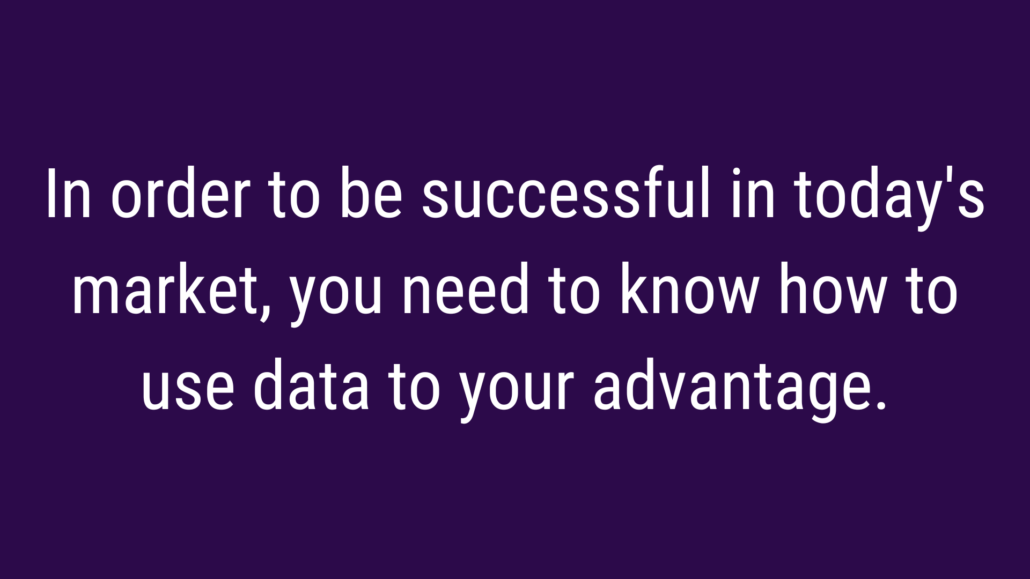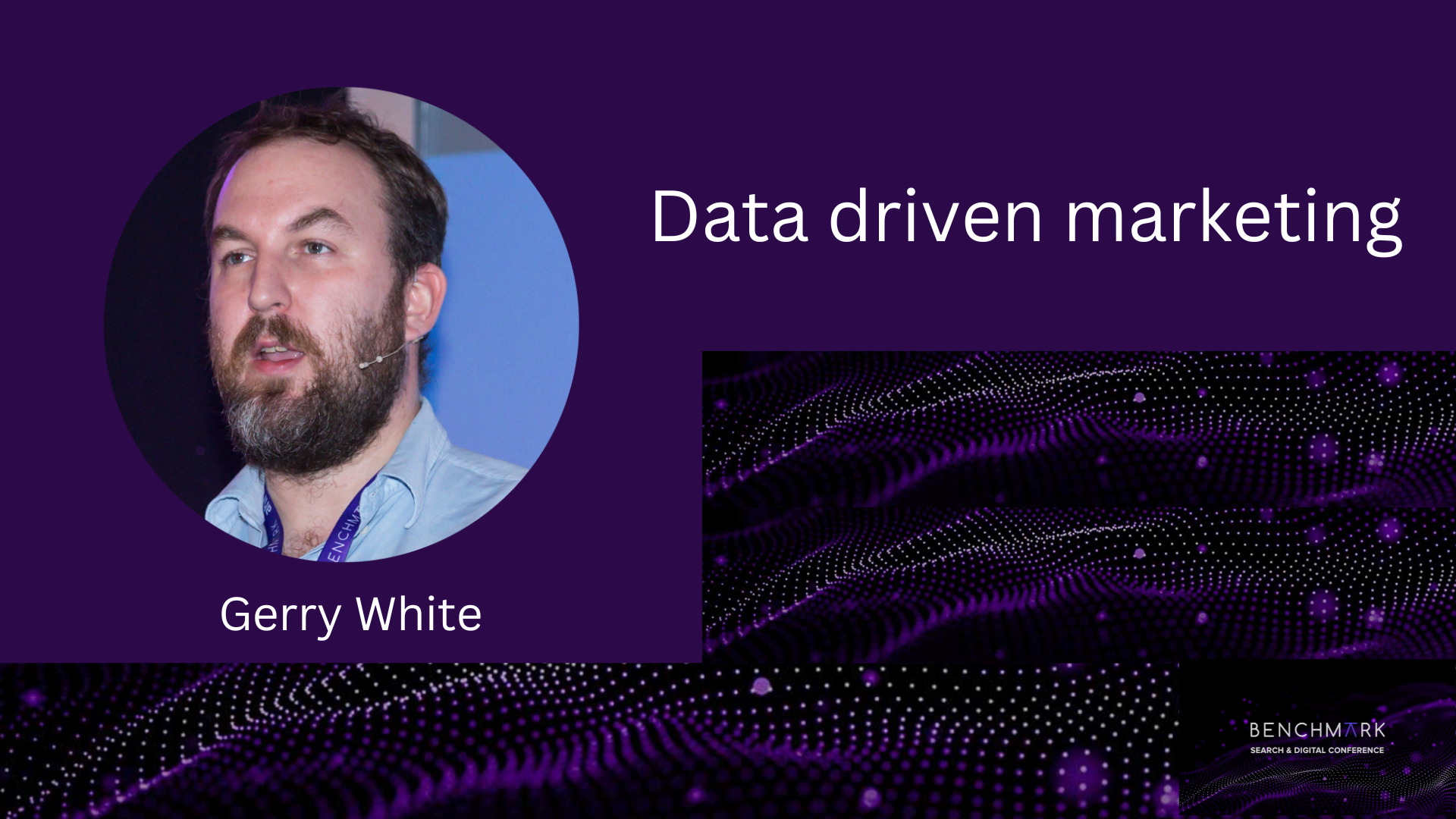Who is Gerry White?
Gerry White has been in the industry for 20+ years, with a background in development he transitioned to technical marketing leading on SEO, analytics and digital growth strategies for companies, agencies, the government and corporations such as the BBC. In the past few years, Gerry has spoken at conferences around the globe including Paris, Germany, the USA and of course the UK.
Gerry was the Technical SEO Lead for Just Eat an FTSE 100 company in 12 markets as well as consulting for other e-commerce brands. Gerry White was the SEO Director for Rise at Seven from 2020 to 2021 when they grew from 15 to 115 people before returning client side as the head of SEO at Oda an international supermarket.

In his spare time, Gerry White co-runs a digital roundtable conference called Take It Offline which aims to replicate the best of the post-pub conversations, typically in a pub.
Why Data-Driven Marketing Matters
As a business owner, you’re always looking for ways to get an edge on the competition. Marketing is one of the most important aspects of running a successful business, and making sure that your marketing efforts are as effective as possible is crucial.
One of the best ways to ensure that your marketing is as effective as possible is to make sure that it’s data-driven. In other words, you need to base your marketing decisions on hard data and analytics, rather than making assumptions or going with your gut feelings.
There are a number of reasons why data-driven marketing matters:
- It allows you to make more informed decisions. When you have data to back up your decisions, you can be confident that you’re making the right choices for your business.
- It helps you track your progress. By tracking the data, you can see what’s working and what isn’t. This allows you to make necessary changes to your marketing strategy on the fly.
- It provides insight into your customers. When you have data about your customers, you can better understand their needs and wants. This allows you to tailor your marketing efforts to them specifically, which will result in more sales.
- It saves you money. Data-driven marketing is more effective than traditional marketing, which means that you’ll get a higher return on investment (ROI). In other words, you’ll save money in the long run by investing in data-driven marketing.
- It helps you stay ahead of the competition. By being data-driven, you can always be sure that your marketing efforts are at the cutting edge. This allows you to stay one step ahead of your competitors, who are likely still relying on traditional methods (like intuition).
Determining What Data is Okay and What Data is More Important
The world of marketing is always changing, and it can be difficult to keep up with the latest trends. However, one trend that is here to stay is data-driven marketing. In order to be successful in today’s market, you need to know how to use data to your advantage.

One of the most important aspects of data-driven marketing is determining what data is okay to use and what data is more important. For example, you may have a lot of data on your customer’s purchase history, but not all of it may be relevant to your current marketing campaign. On the other hand, there may be some data that you didn’t even know you had that could be really useful for your current campaign.
So, how do you determine what data is okay to use and what data is more important? Here are a few tips:
- Know your goals. Before you start looking at all of the data you have, know what you want to achieve with your marketing campaign. This will help you narrow down which data is relevant and which isn’t.
- Talk to your team. Your team probably has a lot of knowledge about your customer base and what they’re looking for. Utilize this knowledge by talking to them about which data would be most useful for your campaign.
- Test things out. Once you’ve determined which data is most important, test out different scenarios with that data until you find the perfect solution for your campaign.
- Keep track of your results. Always keep track of the results of your marketing campaigns so you can see which data is most useful and which isn’t. This will help you fine-tune your strategies over time.
Company Benefits of Doing Data Driven Vs. Traditional Inbound Marketing
There are a number of benefits that companies can experience by doing data-driven marketing as opposed to traditional inbound marketing. Perhaps the most significant benefit is that data-driven marketing enables companies to make more informed decisions about their marketing efforts. When done correctly, data-driven marketing can provide invaluable insights about what is and is not working for a company. This information can then be used to adjust campaigns and strategies accordingly in order to maximize results.
Another benefit of data-driven marketing is that it allows for more targeted and personalized messaging. By understanding who your target audience is and what they are interested in, you can create content and ads that are more likely to resonate with them. This leads to higher engagement rates and conversions, as well as improved brand awareness and loyalty.
Finally, data-driven marketing simply tends to be more effective overall than traditional inbound marketing techniques. With a laser-focused approach backed by reliable data, companies using data-driven marketing can expect to see better ROI from their campaigns compared to those who rely on older methods.
Examples of Companies Using these Techniques Successfully in Practice
In the current marketing landscape, data-driven marketing is the key to success. By incorporating data into every aspect of their marketing strategy, companies are able to make more informed decisions that lead to better results.
Here are a few examples of companies that are using data-driven marketing successfully in practice:
1. Coca-Cola
Coca-Cola is one of the most recognized brands in the world and they are also a prime example of a company that uses data effectively in their marketing. They have a dedicated team of analysts that collect and analyze data from a variety of sources. This information is then used to improve their marketing campaigns and ensure that they are reaching their target audience. Not just that but they also use data to come up with new products and flavours. For example, Cherry Sprite was inspired by the data pulled from their Freestyle dispensers.
2. Amazon
Another company that has mastered data-driven marketing is Amazon. They use data to personalize the shopping experience for each customer and recommend products that they may be interested in. This has led to increased sales and loyalty from customers.
3. UPS
UPS is a company that has used data to improve their operations. By collecting data on package delivery times, they were able to make changes to their routes and schedules which resulted in more efficient deliveries. This not only saved them money but also improved customer satisfaction.
Before You Change Your Inbound Strategy to Data-Driven marketing
There are a lot of companies out there that are looking to change their inbound marketing strategy to be more data-driven. However, before you make this change, there are a few things that you need to take into consideration.
First and foremost, you need to make sure that you have a good understanding of your customer data. This includes knowing who your target audience is, what their needs and wants are, and how they can be best reached. Without this knowledge, it will be difficult to create an effective data-driven marketing campaign.
Secondly, you need to have a plan in place for how you are going to collect and analyze your customer data. There are a lot of different tools and technologies out there that can help with this, so it’s important to do some research and find the ones that will work best for your needs.
Finally, once you have all of the necessary data collected and analyzed, you need to create a plan for how you are going to use it to improve your marketing efforts. This includes developing targeted content and campaigns that address the specific needs of your target audience.
By taking the time to consider these things before changing your inbound marketing strategy to be data-driven, you will be much more likely to succeed in your efforts.


Leave a Reply